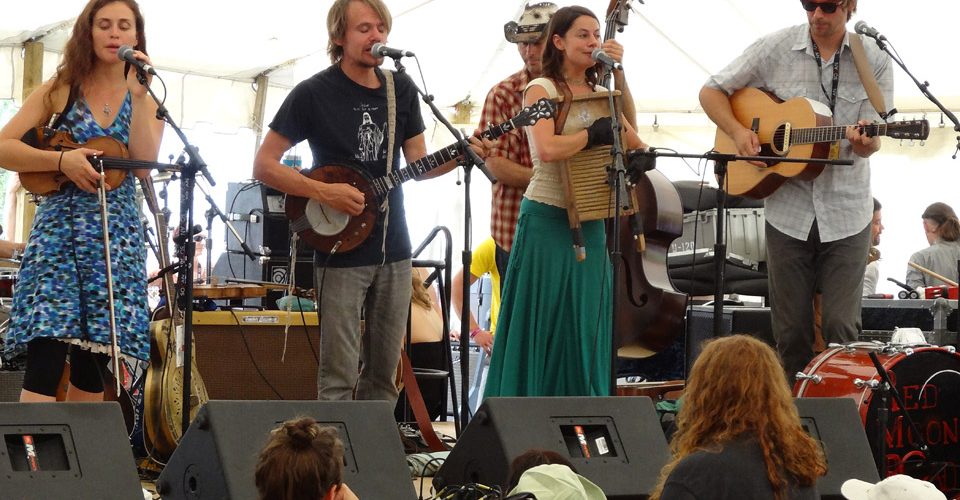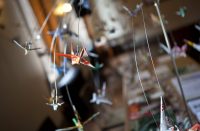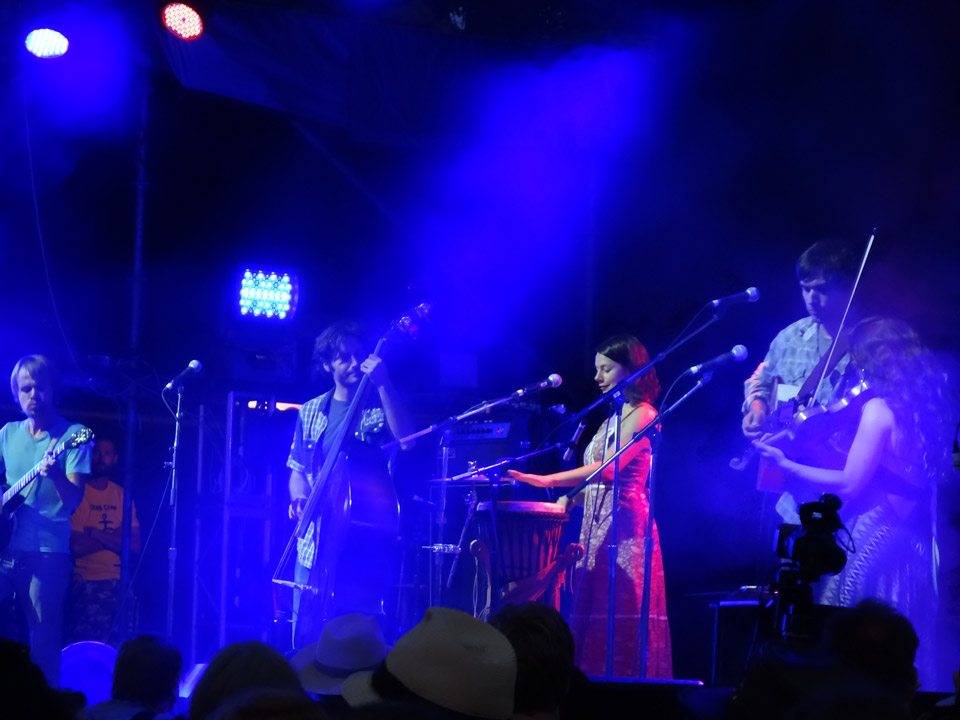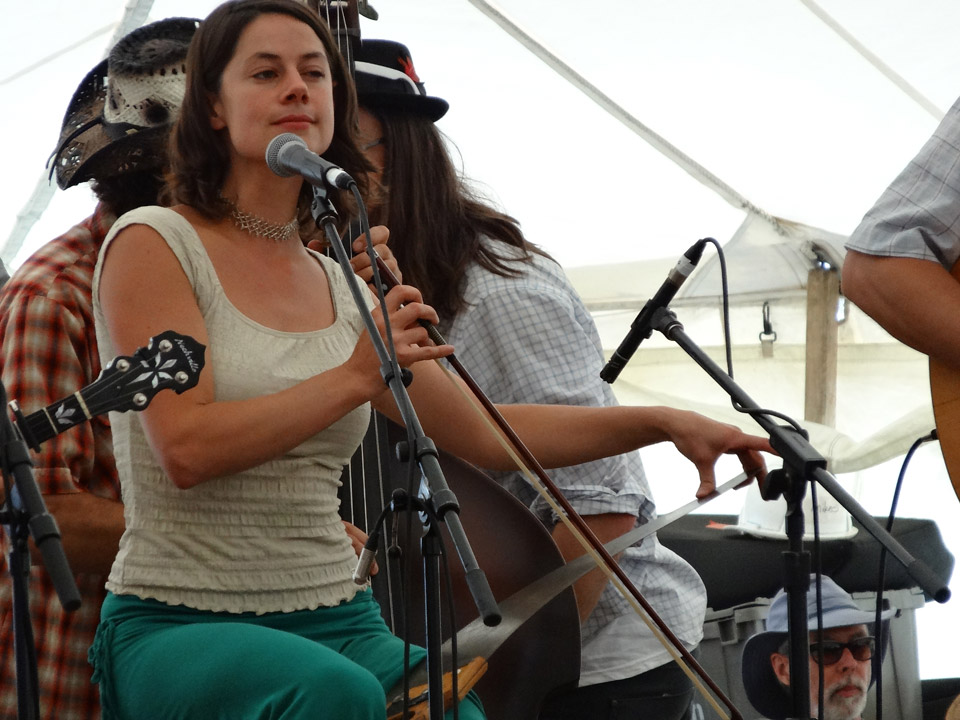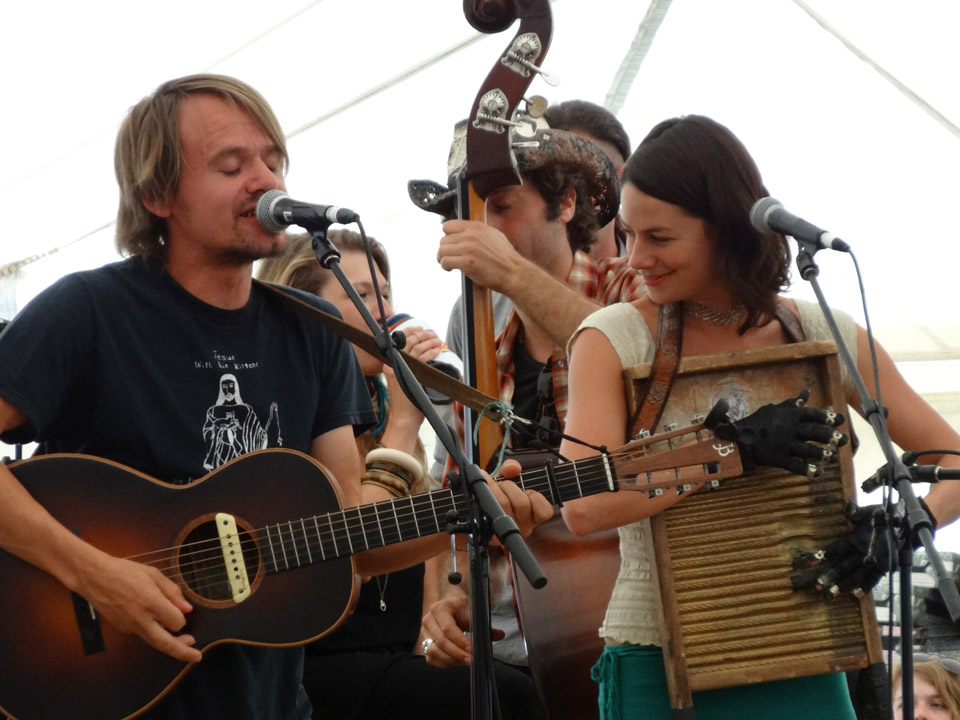In his brief career, Phil Ochs wrote over 100 songs – many of them about civil rights and other caring social/environmental observations. “When I’m Gone” was just one of his many anthems pointing toward a better world. From a songwriting standpoint, Elephant Revival does not appear to be influenced by Ochs’ music, but on the spirit level, there is arguably a connection.
In his brief career, Phil Ochs wrote over 100 songs – many of them about civil rights and other caring social/environmental observations. “When I’m Gone” was just one of his many anthems pointing toward a better world. From a songwriting standpoint, Elephant Revival does not appear to be influenced by Ochs’ music, but on the spirit level, there is arguably a connection. The quintet’s sometimes haunting, sometimes celtic, and sometimes downright rootsy sound very often gives voice to the Earth itself. With all of the socio-ecological projects and sensitivities that also connect the group, Elephant Revival have transcended the essence of folk music to a 360° approach on planetary care. Intentionally or not, they are in sync with Ochs’ song. “… Won’t be asked to do my share when I’m gone / So I guess I’ll have to do it while I’m here.”
I spoke to the two women of the group: washboard wonder Bonnie Paine and violin virtuoso Bridget Law. I started the conversation by asking about the second song, “Remembering a Beginning”, on These Changing Skies (their newest album at the time, and one that I could not stop playing after picking it up at Hillside 2014).
What came into your head to write “Remembering a Beginning”?
Bonnie: I had read a book called The Spell of the Sensuous [Language and Perception in a More than Human World] by David Abram and he was talking about how everything is communicating. If it can appear visually, then it is communicating, and that’s its form of communication. To acknowledge that just brings such depth into everything and so I kept thinking about the sky. The album before this is called Break In the Clouds and I had been trying to figure out how to draw clouds. They’re never stagnant. They’re constantly changing. They don’t even look real when you are looking at them and so to draw them and make them look real is really hard. So I kept thinking about sky as an entity that communicates – and if it could communicate all the changes that it has seen, and the way that it encompasses our planet – how amazing that would be. We were travelling along the San Andreas Fault and I kept thinking about how the land had changed and would change from that fault line, and the sky’s perspective of it.
You folks are associated with some pretty amazing organizations. The Conscious Alliance looks like a beautiful effort. Calling All Crows – can you tell me more about them?
Bonnie: Our friend Chad Stokes is the one who introduced us to the organization. I think he’s a big part of who started it. It’s his foundation. Chad is the front man of a band called DISPATCH and they are an amazing group of people. They do a lot of work for hunger and they were working with women in Africa who were given stoves because a lot of women were getting abused on their way to gather firewood. The proceeds also went to help women from the injuries they had gotten from being raped on those journeys. So a lot of it is for empowering women plus helping the homeless.
Bridget: It’s set up as a fan outreach program so that the fans can get involved with volunteer programs and different volunteer opportunities in their area. So every time Chad Stokes plays a show in any city, he comes early and he does some sort of volunteer event. He hosts it with his friends and fans to bring people together, and bring awareness to different issues – both in that area and in international issues like the one Bonnie discussed.
So it’s like a benefit for that organization plus an outreach?
Bonnie: Yeah – It’s set up so that the fans can talk to them and get pamphlets so they can get some kind of idea of what kind of work they are doing.
With that kind of engagement, do you see any sort of payback?
Bonnie: One thing that’s really nice about that particular group is that a lot of the younger kids get involved. It gives them another opportunity to know the artist. Maybe they can’t go to the show because it’s not an all ages show, but it’s another opportunity to get involved. I think that’s great thing – anything you can do to incorporate the teens is really special.
What comes first – music or environment?
Bonnie: I think they’re pretty intertwined. The inspiration for the music comes from natural settings for the most part – and finding peaceful places, so one wouldn’t really exist without the other. It’s such an integral part of the birthing of the songs in the first place, so in a way, that comes first or we wouldn’t really have anything for people to enjoy.
Were you folks friends before you had a band together?
Bridget: Yes – for a couple of years.
Were you on similar paths at the time – same interests?
Bridget: I definitely feel that [environment] is an ideal for us. That [environment] is a value that was really important to all of us, and in the end this connected us. Festivals like Hillside are opportunities where you witness people who care and want to be connected and want to learn, and want to share information. So the environment is what’s calling to us; it’s what’s asking us to be aware of it right now. By travelling with the music, I feel like we are kind of ambassadors for the land – we are trying to be.
How do you inspire that caring?
Bonnie: That’s why I love music. There’s something different about telling somebody about their connection to the planet. Music brings a feeling. You don’t necessarily use words to impart that to somebody, but music gives you a sense of the inextricable part that you are to everything.
Bridget: Music’s like an invitation to feel those thoughts and emotions together all at the same time and you’re not really sure what you are sensing, but the poetry and the way that you know we are all feeling is like a greater message that we can just tap into.
This is old news to you and I hope that you don’t mind my asking this question, but you have such a poignant story on your website about two pachyderms – elephants to be specific – how they lived together for 16 years, then separated by zookeepers. Within days of the separation, both elephants died. How did you hear about that?
Bonnie and Bridget [mashed story; now a proverbial folktale]: Our bass player [Daniel Rodriguez] busked in front of the elephant cage in Lincoln Park zoo in Chicago, where he grew up. He knew that two elephants had once lived together there and one had been sold to the Salt Lake City zoo. He sought out rest of the story and was very touched. He felt the desire to bring them and us together. We were scattered all around the country and he saw this as a sign for us to come together as a tribe.
What song or event inspired you – made you realize that things had to change? Was there anything that lit a fire in your belly?
Bonnie: There were multiple things. I remember going to a Montessori preschool and there was by the light switch a picture of the planet Earth. Basically it was a reminder to turn the lights off whenever you leave one of the stations. That was the first time I remember that yeah – these lights use energy. That was one of my early recognitions that you need to be conscious of how much you use. Still at my dad’s house where I was born and raised, you have to build a fire for hot water. That was one of my chores in the morning. It made me aware of the use of fuel and how much we use.
Bridget: My mom took me to Hands Across the World once when I was three years old. It’s hard for me to remember because I feel like I’ve always grown up with that notion. I grew up in a liberal part of the city and I went to Waldorf school so it was definitely instilled in me. But I remember Hands Across the World. I was really young and it was such a beautiful thing. It was all across the State of California. My mom tells the story that I heard about this event (or she old me about this event), and I told her that we had to go. So she took me. I believe at the time, it was a protest on a power plant that was going into part of California.
Have you noticed a rise in environmental consciousness (for example, beyond recycling and composting) in your circles?
Bonnie: Yeah – I don’t have to explain why I bring my own thermos and to-go containers any more. People used to look at me like I had some kind of neurosis or phobia or something. I’d get overly explanatory and say things like “It’s because I want to reduce trash … those things just don’t disappear even if they’re recyclable.” Now everybody knows, and it’s a relief to not have to explain that.
Bridget: People take steps where they can, and they are learning to take steps where it’s possible. Our government and different organizations are trying to make that easier. I think we’ll see a lot of changes over time.
Where’s your favourite place on Earth? Where do you like to be?
Bridget: I’m a big fan of this spot by the Colorado River. We live in Colorado, and I spend a lot of time paddle boarding at this spot. The Colorado River is endangered. It doesn’t make it all the way to the Gulf [of Mexico]. But it’s flowing really well right there so I’m not very far from the headwaters. It’s just this amazing place where 20 minutes before, you are at the top of the continental divide where there’s still snow till July, and you come down into this valley and it’s desert and red dirt. It feels like a really sacred place to me and I spend a lot of time there. I think I’d call that my favourite place to be. The Colorado had a good year – we’re pulling for it.
Bonnie: There’s a lot of places I’ve seen in National Geographic where I would love to go. But Spring Creek in Oklahoma, where I grew up – at Tahlequah – there’s a natural spring-fed creek with bluffs and it’s just beautiful, very clear, clear water. It’s a very peaceful and magical place. There’s areas of it where you can still see water bubbling up from the ground. All my family is there and we have some really sweet memories. Lots of owls and wildlife – yeah, I love Spring Creek. I hope it stays clean. It’s part of one of my goals in life to figure out how to help that place stay clean. There are so many pig and chicken farms that get set up along bodies of water. I’ve watched most of them change really quickly and I’m so glad this one hasn’t yet.
You’ve witnessed a lot of initiatives at various festivals and I love that you say that this is the most environmental festival. It’s the most environmental one I know too. But other festivals have interesting ideas to steal too. Are there any ideas that you can share here?
Bridget: More yoga is always good.
Bonnie: I was thinking about the boat that we rode over [to the island]. It would be kind of neat if there was the option – I’m grateful that there’s a boat at all, but if it didn’t use fuel. If we could paddle across –
Bridget: Yeah – because then you’d feel really involved in the water too.
Bonnie: That would be really nice. We have a friend [Scotty Stoughton] who has a festival called Camp out for the Cause and he’s a big supporter of paddle boarding.
Bridget: That festival is actually located on that spot that I was talking about on the Colorado River. It’s on Memorial Day weekend. You should go, it’s really neat. The whole festival is a non-profit festival raising money for disaster relief – Haiti – it puts instruments into the hands of kids, and things like that. It’s very cool. And there’s a yoga class between every main stage set. You can get on a paddle board right there at the festival, and ride it for miles down the river – and then they’ll take you back.
And there’s a gentleman in Toronto who hosts a bike-powered festival. The whole festival is powered by the crowd bicycling. He loves talking about environmental initiatives and he’s a real sweetheart. You should talk to him.
Check out Elephant Revival tour dates.
Their new live album Sands of Now will be released on July 24, 2015.
Marcia Ruby is the publisher emerita and creative director of Alternatives Journal.


